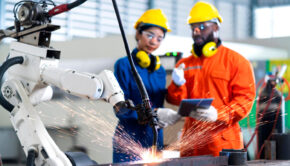How Technology Can Make Travel Safer
Whether you’re a dedicated tech junkie or prefer to live an analog life, you’ve likely heard recent news stories that question whether technology makes travel safer or more dangerous. Stories of failed airbags in cars and problems with Boeing 737 sensors have brought the debate of the role of technology in safety to the forefront.
The history of technology and safety is long and full of inventions, such as rearview mirrors and brake lights, that we often take for granted today. In many ways, technology has made travel safer and can even help prevent safety features from failing.
But could too much dependence on technology actually make travel less safe? There are pros and cons for both sides of the debate, both in terms of vehicle safety and airplane safety.

Image Source: Unsplash
Vehicle Safety
Good drivers know not to depend on technology in order to stay safe on the road. It’s largely the responsibility of the driver to follow road safety tips like staying calm in the midst of traffic and not drinking and driving.
However, technology does play a big part in features that help keep cars and their passengers safe today and throughout the years. From anti-lock brakes to airbags, technology is hard at work while you’re on the road. The problem comes when those safety features that you rely on malfunction.
In the case of the 12.3 million vehicles under probe in the U.S., the airbags in those vehicles may not inflate in a crash because of a problem with technology. Other airbags inflate too forcefully, causing injury or even death to those in the vehicle seats.
When technological safety features fail in a major way like this, it’s important to know your legal rights so you can protect yourself. If a feature in your car doesn’t work like it’s advertised, you can likely prove a defect and sue the manufacturer, distributor, wholesaler, or retailer. You may be able to receive compensation for your injuries and any lost wages you experience due to missing work for medical reasons. If you have the evidence to prove that you were injured due to a defective part of your vehicle, you likely have a case.
Airbags and other safety features work more often than not, but unfortunately it only takes one faulty airbag to question the role of technology in safety and learn to be prepared for the worst. We need technology to keep us safe, but we also need to be able to function without it in case of a malfunction — imagine driving without seatbelts, anti-lock brakes, or even a GPS, for example. We also need to be aware of its limits.
Airplane Safety
Airplane travel also comes into question when discussing how technology keeps us safer and knowing what to do when it fails us.
The recent problems with the Boeing 737 max sensors brings to light the responsibility of pilots and airplane safety workers to address any safety concerns before it’s too late. The fact that Boeing knew there were problems with its max sensors and failed to disclose that is more a human error than a technological one.
The fact that we can fly through the air is a feat of technology in and of itself, and there’s no question that technology helps keep us safe in many ways. Because we depend on that technology so much, ensuring the safety of a plane, particularly when retrofitting older models, is perhaps the most important thing that needs to happen before that plane leaves the ground.
Transparency between airlines and the public is key in keeping trust alive so that people feel safe flying and know they can count on airline professionals to do their jobs.
Pros & Cons of Technology
Technology impacts every area from our lives. Smartphones and social media have changed the workplace, while our options for transportation are constantly being upgraded to be more convenient, efficient, and faster. There are even inspection robots built to monitor safety concerns in hazardous locations. Technology is everywhere.
Ever-present technology means that more and more is becoming possible each day. New options open up to us as solutions to our everyday problems are invented. For example, people with chronic conditions can better monitor and manage their health while traveling by using wearable technology. Technology often makes our lives easier and safer.
However, because we depend on technology so much, danger arises when that technology fails. We need to respect what technology offers us as well as respect its limits if we are going to thrive. Technology undoubtedly has made us safer in many ways, but too much dependence could surely tip the scales into dangerous territory.
By being aware of the ways in which technology can malfunction, we can be better prepared to deal with those failures before major safety concerns arise. The role of technology is only going to keep growing, so the quicker we learn to work with it, the better.
















